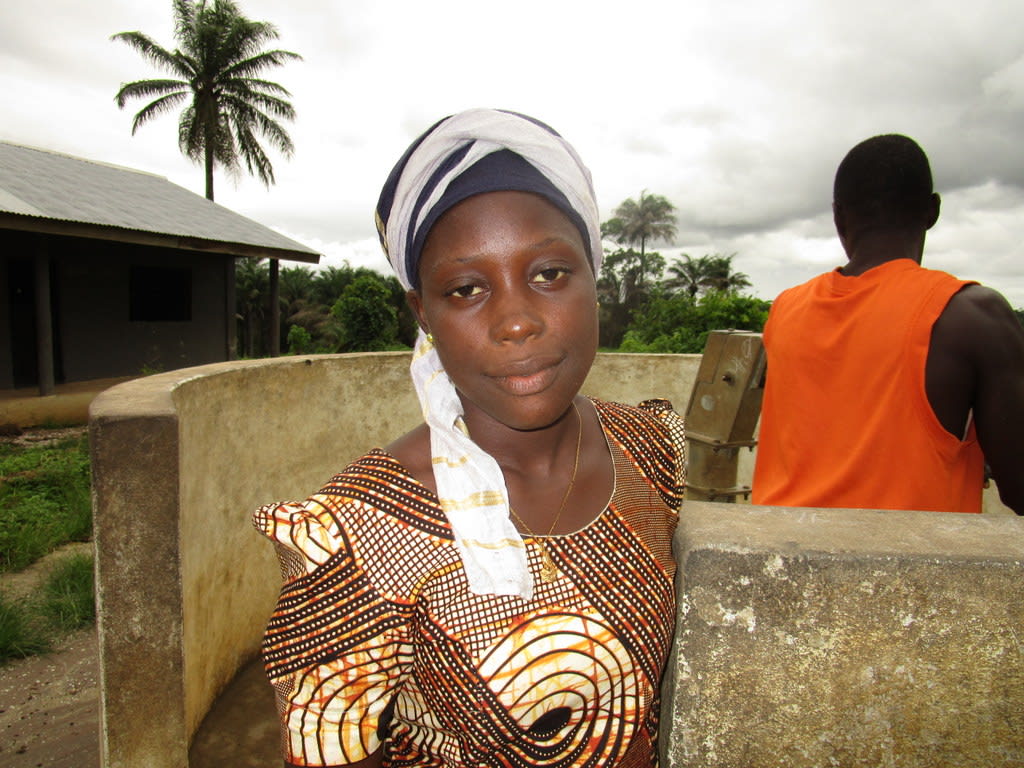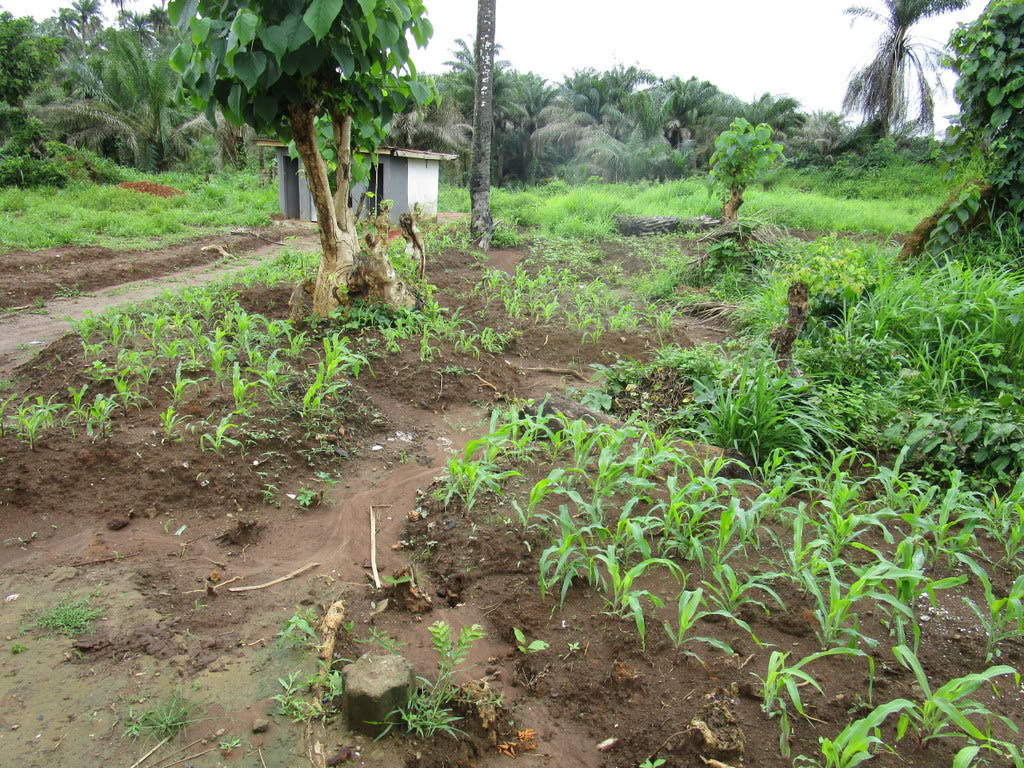Ebola’s Impact
Ebola has been a tragic reality for the people of Sierra Leone over the last two years. Though considered stable at the moment, the country is still very cautious.
Our teams have remained safe and are on the front lines of Ebola prevention through this water, hygiene and sanitation program. Your support acknowledges and celebrates their selfless work and bravery.
The entire team continues to express their gratitude for your support of communities in Sierra Leone, and we can’t wait to celebrate safe water together!
Welcome to the School
A normal day for teachers and students of Sanaya Memorial Academy begins at 5:30 am. Ibrahim Sorie Kamara, vice principal, wakes up especially early to wash before going to the mosque for morning prayers. After prayers, he suits up and begins the long trek to his school grounds. He lives three miles away from the school yard! The vice principal is the first to arrive at the school every morning to prepare documents and time sheets for the teachers to sign upon arrival. The students arrive at 7:30 am, and at 8 am they start devotionals. The school is a Christian, but with students and teachers from all religious backgrounds. The school is the first secondary school in the Mamankie Section to have a population of over six thousand people! Some of these students travel up to six miles for school. The ones that can afford a motorcycle ride instead of walk. The others who cannot afford motorcycles will either use bicycles or get up at the crack of dawn for the long walk.
(Editor's Note: While this many people may have access on any given day, realistically a single water source can only support a population of 350-500 people. This community would be a good candidate for a second project in the future so adequate water is available. To learn more, click here.)
The school offers a broad range of subjects so that students have the opportunity to catch up with peers who attend better-funded schools. This school is a blessing to the community, so if a borehole is dug within the schoolyard, the blessings will continue. All the classrooms have drinking buckets with water that is fetched from a stream roughly forty minutes away from the school. Both the students and teachers drink contaminated water on a daily basis simply because there is no other option. Either drink the dirty water or suffer from dehydration, and whoever can afford to buy bottled water does so. The students cannot even afford to buy food, so it is very unlikely that they can afford water.
Water Situation
The stream yields water that is obviously contaminated. The water flows by very slowly, and thus becomes very muddy as locals fetch.
Students opt for using containers with large openings in order to see large debris such as rags, soap suds and old slippers that could easily be scooped from the water. Since the stream is far from school, a five-gallon bucket is the container of choice for the students, no larger. They will take off their shoes and socks to enter the stream with water knee-deep. Fetching water from this stream requires a keen eye and close attention not to take a tadpole or small fish back to school! After the water is brought back from the stream, twenty minutes is allowed for it to settle.
A visit to the stream reveals people doing laundry just inches away from where the students fetch drinking water. Dirty rags, leaves, and all kinds of debris was seen floating in the stream. Even some of the students and community members use the bushes just above the stream as toilets.
Students complain of stomachaches, fevers and headaches on a daily basis. Students miss many days of school because of bacterial infections they get from drinking this contaminated water. These are classic symptoms of typhoid!
Sanitation Situation
There are four usable pit latrines on campus, which all need improvements. The smell is awful and stains are all over. There is no evidence of soap or any other disinfectant - there is just water. The stalls are very small and the doors do not lock properly. As of now, the roof is the only good thing about these latrines. Open defecation is also an issue since there are only four stalls available for such a large student population. There are three hand-washing buckets, but these do not have soap available either.
The school disposes of garbage behind the latrines, and the paper trash is burnt. We will be working with the school to have a dustbin dug and a stick fence built around this area. We will encourage weekly burning during the dry season and will discuss a plan for when the rains come: trash should be thrown into the hole rather than on the school grounds.
Plans: Hygiene and Sanitation Training
Community members, teachers, and students will be trained for three days, three hours a day.
The objectives specific to Sanaya Memorial Academy Secondary School are sanitation, proper methods of hand-washing, and environmental hygiene. The school lacks adequate latrines for the amount of students, teachers, and staff, as well as the traders who sell food products inside the school compound. The school has access to dirt, so they could beat mud blocks to build additional latrines. We will encourage the school to construct another set of latrines, along with repairing and cleaning the ones they already have.
Members of the Child Health Club will also have a chance to build their own hand-washing stations. Students will bring a one-gallon container to construct these during training.
Plans: New Borehole
Vice Principal Ibrahim Sorie Kamara says, "Clean water, clean hands, clean hearts; clean and brilliant students. The current health situation is manageable! The constant stomachache, fever and typhoid are daily occurrence. The constant absent of students is due to the unsafe water source the school depend for their drinking water." He submitted an application to our office, and after initial visits and reviews, the school was chosen for a new borehole. Their needs and cries for help echoed through to us loud and clear. Initially, this school was considered for a well rehabilitation. However, a closer inspection of the inside revealed that the well had not been constructed properly, caisson were dislodged across the bottom of the well, and the lining was not properly tied. It would have been like burning money to repair this kind of well; the better use of funds is to drill a borehole which will serve this school and community for generations to come.
The new well will be located on school grounds, and the households within ten to five hundred meters are also allowed to use the pump. Now that students (especially the girls) have the ability to remain on school grounds throughout the day, they no longer have to fear the sexual harassment they previously encountered on their way to fetch water.
The headman is just one person living nearby who will benefit from the proposed well. The vice principal, Mr. Kamara, is overjoyed about having a well in his school. The school was built for the thousands of students who cannot afford to attend other schools because of their high fees. Both the headman and school leadership are enthused. Mr. Kamara thankfully shared, "Generations passed and finally God has done it for us!"

 Borehole Well and Hand Pump
Borehole Well and Hand Pump
 Rehabilitation Project
Rehabilitation Project






















